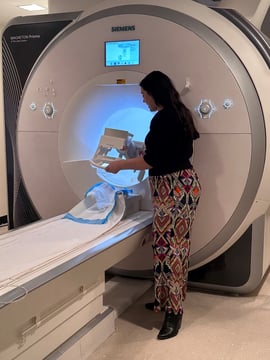
Megan Caruso grew up in Rhode Island with a passion for medical research. After earning degrees in neuroscience and studio art, she gained hands-on healthcare experience through internships in hospitals and clinics. This path led her to become a project coordinator at Butler Hospital’s Memory and Aging Program (MAP), where she now manages a study on Cerebral Autosomal Dominant Arteriopathy with Subcortical Infarcts and Leukoencephalopathy (CADASIL).
What is CADASIL?
CADASIL is a rare, hereditary condition caused by mutations in the Notch3 gene on chromosome 19. It causes strokes, migraines, and vascular dementia due to damage to small blood vessels in the brain. Symptoms can appear anytime from a person’s 20s to 60s. “It doesn’t always affect cognition,” Caruso explains. “Onset can span many years.”
CADASIL Research Study Details
By collecting data over several years, this observational study aims to better understand CADASIL and pave the way for future treatment trials. “We’re in a really interesting spot where research is picking up speed,” says Caruso.
Most participants travel long distances to take part in the study at MAP, which is one of only 12 sites conducting this research across the United States. Caruso helps coordinate their visits, which include
- Cognitive testing
- MRI scans
- Lab work
- Consultations with neurologists
All of which is packed into a single 6-hour day. She also assists with travel and provides support between annual visits.
Participant Connection
Caruso’s passion for the CADASIL study runs deep. “It almost feels like fate that I’ve ended up in this role,” she reflects, citing her early experiences with stroke patients and her grandfather’s mini-strokes. “Time and time again, I’ve just crossed paths with debilitating cerebrovascular disease.”
She also connects deeply with patients and loved ones of those affected by this little-known disease. “I come from a very large family, so I can often put myself in their shoes,” she says. And it’s her interactions with participants that drive her motivation. “Being able to work with families and provide them hope for this disease, which has been pretty neglected in terms of research, has been really meaningful,” she shares.
Advocating for CADASIL Patients
 Caruso advocates for more awareness of CADASIL and increased funding for research. “It can appear in many different ways,” she explains. “People with CADASIL are truly warriors. They’ve had to fight to get answers.” She notes that genetic advances and the FDA’s recent approval of a gene therapy may bring new hope. “In 10 years from now, we’ll have a lot more answers than we do currently,” she predicts.
Caruso advocates for more awareness of CADASIL and increased funding for research. “It can appear in many different ways,” she explains. “People with CADASIL are truly warriors. They’ve had to fight to get answers.” She notes that genetic advances and the FDA’s recent approval of a gene therapy may bring new hope. “In 10 years from now, we’ll have a lot more answers than we do currently,” she predicts.
In addition to coordinating study visits and procedures, Caruso helps train staff at other sites and works closely with the central study team for the CADASIL Consortium. “Being a direct liaison between participants and their needs and the central team has been really meaningful,” she says. For example, feedback from female participants led her to recommend changes to health history forms to better capture influences on women’s health.
Through her role at MAP, Caruso is bringing much-needed awareness and research to improve life for current and future generations affected by CADASIL. “I think there’s a lot of hope right now,” she says. Caruso and the team are working diligently to turn that hope into answers.
Outside of work, Caruso enjoys rock climbing, art, concerts, and spending time with family.

 Caruso advocates for more awareness of CADASIL and increased funding for research. “It can appear in many different ways,” she explains. “People with CADASIL are truly warriors. They’ve had to fight to get answers.” She notes that genetic advances and the FDA’s recent approval of a gene therapy may bring new hope. “In 10 years from now, we’ll have a lot more answers than we do currently,” she predicts.
Caruso advocates for more awareness of CADASIL and increased funding for research. “It can appear in many different ways,” she explains. “People with CADASIL are truly warriors. They’ve had to fight to get answers.” She notes that genetic advances and the FDA’s recent approval of a gene therapy may bring new hope. “In 10 years from now, we’ll have a lot more answers than we do currently,” she predicts.